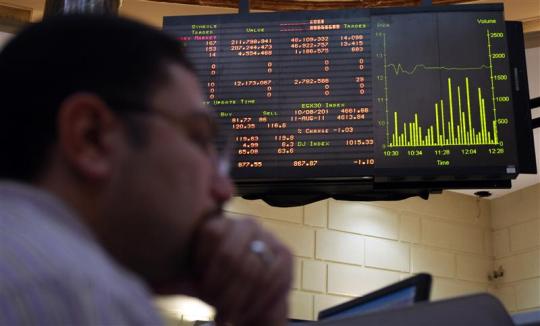Latest NEWS
- Aswat Masriya, the last word
- Roundup of Egypt's press headlines on March 15, 2017
- Roundup of Egypt's press headlines on March 14, 2017
- Former Egyptian President Hosni Mubarak to be released: lawyer
- Roundup of Egypt's press headlines on March 13, 2017
- Egypt's capital set to grow by half a million in 2017
- Egypt's wheat reserves to double with start of harvest -supply min
- Roundup of Egypt's press headlines on March 12, 2017
Egyptian stocks rebound on hope of end to crisis

Stock market, August 2011 - Amr Dalsh/REUTERS
LONDON, July 2 (Reuters) - Egyptian stocks jumped almost 5 percent on Monday on hopes an army ultimatum could bring in a power-sharing deal, although its other assets weakened and broader emerging equities fell off recent two-week highs.
With investors likely to stay on the sidelines ahead of this week's U.S. jobs data, the focus was onEgypt, where the Cairo bourse hit nearly a one-month high after the army gave President Mohamed Mursi 48-hours to strike a deal with the opposition or step down.
"News of an army ultimatum on Mursi's government is in my view the introduction to a more formal army intervention," said Luis Costa, head of CEEMEA debt and FX strategy at Citi.
He added that the army intervention after the toppling of Hosni Mubarak two years ago had "helped stabilise the political landscape following the Arab Spring, and handed back the country to a democratic government."
Liquidity has dried up in the CDS and currency forwards market, with 5-year credit default swaps not traded, according to Markit. They had hit a record high of 925 bps on Monday, which Costa says implies a 40 percent probability of default.
The yield premium on Egypt's dollar bonds over U.S. Treasuries on the main EMBI Global index rose 4 basis points to around 784 bps, after jumping 15 bps. The 2020 dollar bond yield inched up to around 10.5 percent, though it stayed off the record lows hit at the end of last week.
Meanwhile one-year pound/dollar forwards moved again to be quoted at around 9, implying a depreciation of around 22 percent in the coming 12 months.
"The panic in pound markets is likely to remain very high whatever the outcome tomorrow. We now have turned bearish on all EGP assets, and expect the pound to be subject to strong depreciation risks given the political turmoil and the increase of import that comes usually with Ramadan," Societe Generale analysts said.
Ramadan refers to the one-month period of religious fasting which commences on July 9.
There are some fears the turmoil in Egypt could spread to other countries, with protests already having disrupted oil output in neighbouring Libya and Turkey's government too facing widespread demonstrations.
Turkish stocks fell a quarter percent and the central bank offered $50 million in its currency auction aimed at supporting the lira. The currency has stabilised after hitting record lows to the dollar last week
Broader emerging equities slipped from two-week highs to fall 0.5 percent after manufacturing activity surveys showed signs of further slowdown in China and other developing countries. Chinese shares rose however for the third straight day.
Investors are unlikely to make big moves ahead of the U.S. non-farm payrolls data on Friday as the Fed has made jobs data a key barometer for when it might scale back on bond-buying programme, a decision that will impact emerging markets more than most asset classes.
Russian stocks fell 0.5 percent and the rouble eased to a fresh 11-month low against the dollar
In emerging Europe the Polish zloty was flat against the euro as the central bank started a two-day meeting that could herald an end to a series of interest rate cuts.
Most analysts expect the central bank to reduce borrowing costs by another 25 basis points on Wednesday to an all-time low of 2.5 percent. That will follow Monday's rate cut by Romania and Hungary's decision to ease policy last week.
(Reporting by Sujata Rao and Philip Baillie Editing by Jeremy Gaunt.)










